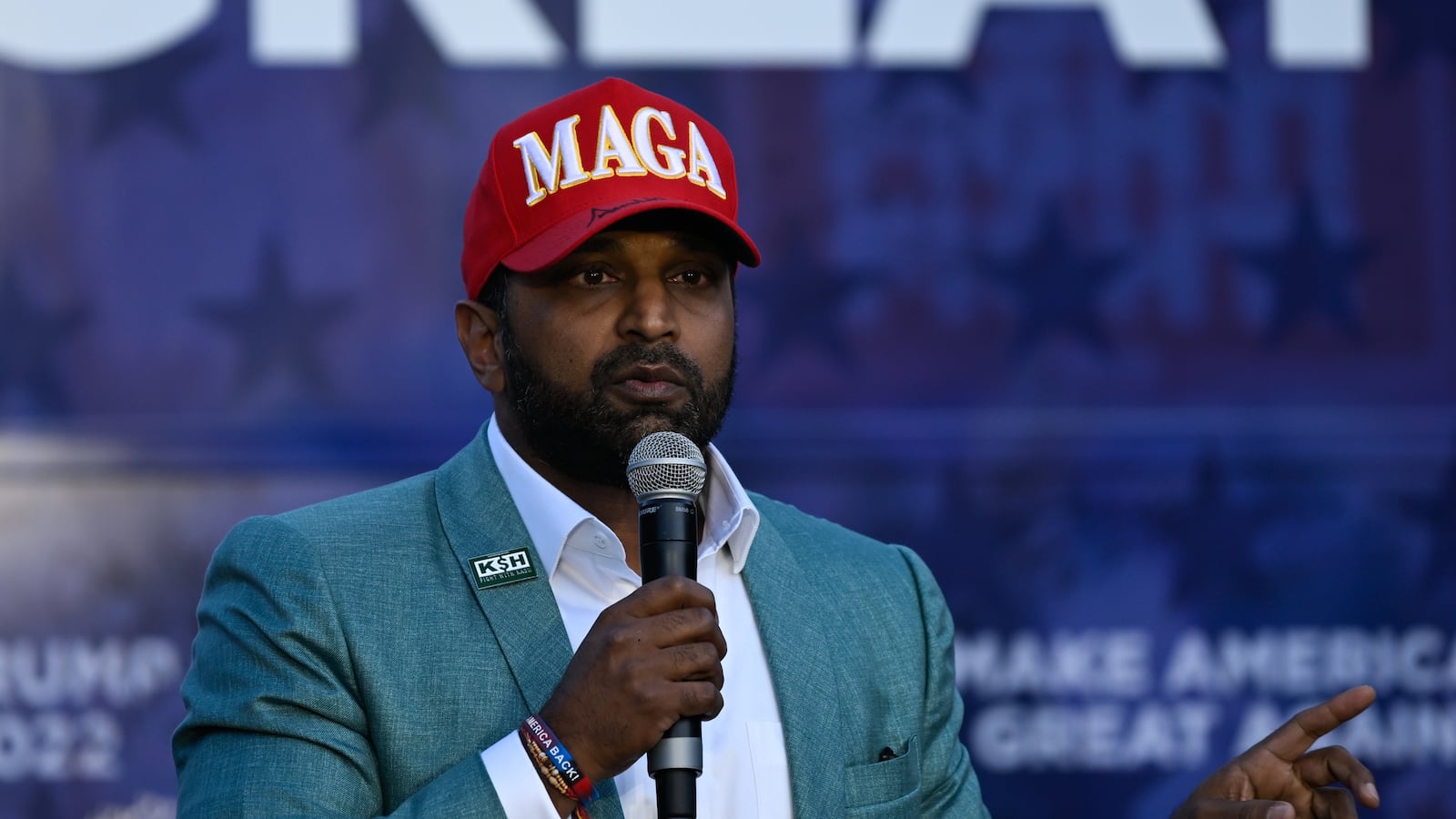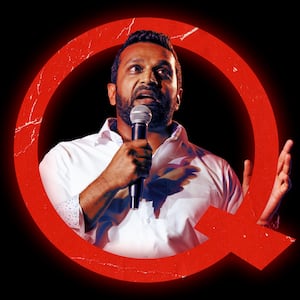Trump and Russia: Remember that? Kash Patel does. It’s the foundational story of his greatness, a greatness he meticulously describes in his September 2023 book, Government Gangsters.
That book offers a freshly warped history of “Russiagate”—the story that dominated the first two years of Trump’s first term, and catapulted Patel from unknown federal lawyer to Trump’s break-the-Bureau nominee for FBI director.
What was the Russia inquiry? In one account of it, eight people pleaded guilty to or were convicted of felonies between 2017 and 2019 by the Mueller investigation, a team of lawyers working under Special Counsel Robert Mueller, himself a former FBI director. Five of them were members of Trumpworld. They included Trump’s former campaign manager Paul Manafort and his briefly-tenured national security adviser Michael Flynn.
You will not find this bare and factual account in Gangsters (Manafort goes entirely unmentioned). Instead you will be told a story out of Wonderland, where Robert Mueller is not the symbol of probity “the establishment” perceived him to be but “an utter swamp creature” who ran a “taxpayer-funded hit job.”
In Patel’s telling, Mueller is just one of many corrupt “Deep State” actors whose avowed purpose since Trump won the 2016 Republican presidential primary has been to destroy him.
There is only one man of integrity in Washington, D.C., swamp city, according to Gangsters: the book’s hero, Kash Patel, or “K$H,” to echo his own promotional branding. (You can pick up a “Fight with K$H” T-shirt for $35 here.)
The only other figure of any repute is Patel’s benefactor—the man he is “starstruck” by when he first works with him in the Oval Office, in whom he can find no wrong—Trump himself.

Patel has an extraordinary rise to describe in Gangsters: his own. The son of Indian parents who fled Idi Amin’s brutal dictatorship in Uganda, he is a product of Garden City High School in Long Island, the University of Richmond, and Pace Law School, ranked 136th out of 196 U.S. law schools by U.S. News & World Report.
He couldn’t get the white-shoe law firm job he expected after acquiring his J.D. Loaded with debt, he ends up in Miami-Dade as a public defender, surrounded by lawyers “to the far left of the left wing”—an unremunerative period he barely describes in the book. (“Yes, some of my colleagues were crazy. But me, I always cared about justice.”)
He gradually rises to become a trial attorney in Barack Obama’s Department of Justice in 2014, before becoming a key aide to Republican Devin Nunes, then chair of the House Intelligence Committee, in 2017 after Trump takes office. That is when his rapid ascent to the side of the once and future president begins.
Gangsters is a surprisingly dishy read: Patel names individuals liberally and is always eager to call out the bad guys as he sees them. He describes “shifty Adam Schiff,” Nunes’ Democratic counterpart on the House Intelligence Committee, as being “from the inner circle of Dante’s Inferno… the definition of a corrupt politician. There is no depth he will not descend to in order to elevate himself and destroy his political opponents at the expense of a nation he purports to serve.”
This is the kind of book from which Elon Musk is sure to retweet context-free passages if alerted to them, because it is full of what you may call plausible specifics: Patel levels detailed accusations by the dozen. Here are five that stand out.
1. The Deep State is an active conspiracy against the American people
“The problems we face are not just the result of our leaders’ incompetence but more so their malice,” Patel writes, adding intent to error. “The media is not just one-sided but liars… the Deep State isn’t some crazy conspiracy but a real force—and the most dangerous threat to our democracy.”
The entire premise of Patel’s book is that “corrupt” actors—he identifies 60 by name in an appendix—are part of an embedded conspiracy whose ongoing power marks the “end of self-government in America.”
“The shocking and terrible details of what the Deep State has already done to increase its power fill this book,” Patel states at the outset, promising revelations that never quite come.

He identifies five types of malicious actor: “elected leaders,” “yellow journalists,” “Big Tech tycoons and actors” (Elon hadn’t swung behind Trump in September 2023), and finally, and most critically: “officials… spiteful mandarins… the unelected federal bureaucracy.”
He seeks to place his lurid story in a grand lineage, invoking Eisenhower’s famous warning against the military-industrial complex, which Patel casts as having evolved into the Deep State of today.
2. You are until innocent until guilty—unless you’re a member of the Deep State
“Every single person accused of a crime is presumed innocent until proven beyond a reasonable doubt that he is guilty, and the evidence to prove that guilt has to be laid out openly and fairly in a court of law,” Patel writes, laying out a standard he does not uphold in his book.
The 60 named Deep State members of the executive branch he identifies include Joe Biden; Bob Mueller; former FBI director James Comey; current FBI director Christopher Wray, whom Trump wants Patel to replace; and former Chairman of the Joint Chiefs of Staff Mark Milley.
They also include unknown figures like former intelligence community Inspector General Michael Atkinson, who is not mentioned in the book at all until he is listed in the appendix as an apparatchik of the Deep State. Patel does not deign to explain why. Only Atkinson knows if he once looked at Patel the wrong way.
3. Patel uncovered the Russia Gate hoax and saved Trump’s presidency
The key story Patel tells in Gangsters is of his role on Nunes’ committee, uncovering what he describes as “the greatest political scandal in American history”: the Deep State bid to cast Trump as Vladimir Putin’s agent.
He tells a pacy story full of play-by-play (“after Devin [Nunes] and Speaker Ryan shared a couple beers on the Speaker’s Balcony at the Capitol Building, Ryan finally agreed”) all in service of his fundamental point: that the Russia inquiry was politically motivated and cooked up by bent agents within the FBI.
Patel focuses on the Steele Dossier—a smattering of salacious and unverified statements about Trump compiled by the former head of MI6’s Russia Desk—and the undeclared motive behind it, namely that the Hillary Clinton campaign and the Democrat National Committee paid for it (via the company Fusion GPS).
This fact, which was not known when BuzzFeed took the unorthodox decision to publish the dossier in January 2017, is to Patel a devastating smoking gun that his dogged investigative zeal, echoing that of Woodward and Bernstein, forced the Deep State to reveal.
As a key author of the so-called Nunes Memo into the Russia inquiry, published in February 2018, Patel points out FBI failings—such as the Bureau’s over-reliance on the Steele dossier to acquire surveillance warrants on a Trump campaign surrogate—that were too briskly dismissed by Democrats at the time, and were later upheld by Inspector General Michael Horowitz, whose integrity is recognized by all and whom Patel notably does not attack.
But Patel’s allegations of a monumental government conspiracy do not follow from his facts.
4. The Russia investigation is symptomatic of the FBI’s corruption
Patel seizes upon minor acts to make major points. Horowitz, the inspector general, found 17 inaccuracies and omissions by FBI agents in their surveillance bids, as well as a failure to be more specific about the partisan root of the Steele dossier. Patel turns those errors into a Deep State playbook:
“First, the FBI or their political allies manufacture ‘news’ stories based on lies and unverifiable hearsay, in this circumstance by claiming Page was trying to secure a deal with Rosneft. The FBI then uses their own planted story to justify investigations of the political opponent.“
“The FBI then leaks the fact that they are investigating the political opponent to the press, which runs stories smearing the political opponent as a subject of federal investigation based on anonymous sources. Those stories would then be used by the FBI to corroborate their ‘amazing’ source reporting and permit their unlawful investigation and surveillance.”
The FBI did err. But the Steele dossier, as Lawfare noted in 2021 (after Trump presented Nunes with the Presidential Medal of Freedom), played “a vanishingly small role in the Mueller report. And Steele had nothing to do with the investigations of [Trump campaign surrogate] George Papadopoulos or Michael Flynn, and little to do with the criminal aspects of the Paul Manafort case.”
“His [Steele’s] information played no role at all in the reporting on the Internet Research Agency or its social media manipulations. Nunes [following Patel’s initiative] was savvy enough to take a muddy area where the FBI’s failures were significant and leverage that into a [false] picture of the entire Crossfire Hurricane investigation.”
5. Patel doesn’t have much to say about reforming the FBI
As the book unwinds, Patel turns it into an extended bid for a job in Trump’s next term. He covers multiple bases of potential future employment, outlining his plans of reform for the FBI, the DoJ, the Department of Defense, and the intelligence community. The message is clear: “K$H” stands ready to help a re-elected President Trump fix any of them.
The reforms he outlines for the FBI are, partly as a consequence, brief in nature, despite him casting the institution as the “prime functionary” of his nominal Deep State. He only spends a handful of pages fixing the Bureau, calling for its General Counsel office to be reined in, the process of acquiring surveillance warrants through FISA courts to be reformed, and bad actors to be brought to heel.
But a truth starts to dawn as Patel unleashes on the FBI: He doesn’t know a lot about it. He hasn’t worked in it, experiencing it only at arms length as an aide of Nunes’s, and viewing it through a prism of deceit of his own choosing.
His most splashy suggestion of reform, since broadcast in podcast videos, is to close down the FBI’s headquarters in Washington and turn it into a Museum of the Deep State.
It is a quintessentially Trumpian suggestion, as bold as building a wall Mexico will pay for, from a man who realized the path to power was to give Trump the loyalty he has always wanted from a director of the FBI.

Patel went on to serve in a flurry of other capacities for Trump, serving as the head of the Counterterrorism Security Group on his National Security Council, as deputy to the acting head of the Director of National Intelligence, and as chief of staff to the Department of Defense, all for brief windows.
He becomes Trump’s “intel guy,” as the president tells India’s Prime Minister Narendra Modi during a state visit to Gurujat, his ancestral home state, where Trump proudly introduces Patel to Modi.
Trump seems to wanted Patel to do every second-tier national security job going at some point during his first term. He was frustrated in that aim by his officials, with Patel blocked from becoming deputy director of the FBI by Attorney General Bill Barr, and deputy director of the CIA by its then-director, Gina Haspel.
Now K$H has been elevated to the top tier, skipping the internal opposition that curbed him. Opposition to his newly proposed power may soon come from a new source: Senate Republicans.







